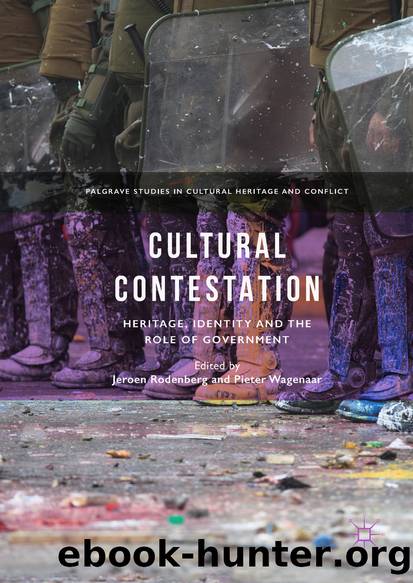Cultural Contestation by Jeroen Rodenberg & Pieter Wagenaar

Author:Jeroen Rodenberg & Pieter Wagenaar
Language: eng
Format: epub
Publisher: Springer International Publishing, Cham
Conclusion
When analyzing Famagusta and its relevance as a cultural heritage site in Cyprus (along with its connections to other Mediterranean sites and therefore its importance for European history), it is inevitable that the political component of such analysis (in the present, as much as in the past) will be highlighted. In sum, Famagusta is the end-result of political changes throughout time, reflected in buildings, urban structures, archaeological sites, and landscapes. But cultural heritage is a concept that emerged within a political setting (the United Nations). It serves political aims (UN member state’s foreign policy ) and facilitates political changes, when needed (UN Security Council Resolutions). The development of parallel management structures such as the BCCH in 2008 is a worthy action; however, ultimately, this measure reflects the impossibility of dealing with cultural heritage in a contested territory within the framework designed under the umbrella of UNESCO and accepted as doctrine worldwide. The risk of sidestepping current instruments on acknowledgment (by national governments), management (by authorities), and preservation (by experts ) of cultural heritage as it has been agreed is the sustainability of cultural heritage and its stakeholders . As such, cultural heritage is a political tool used to recognize state boundaries, rights, and responsibilities, and therefore to prevent contestation. However, there are substantial issues that arise from how we acknowledge cultural heritage that reflects change. (1) Cultural Heritage is, in essence, a mirror of the past, an ever longer past crowded with change and evolution. Still, the structure, conceptualization and definition of what is cultural heritage, generally endorses current political status quo, leaving limited space for discussing culture throughout contestation. (2) To avoid the intricacies of dealing with political instability or unresolved political status, the cultural heritage system has created commissions, committees, and expert groups, to endorse politically unfeasible actions on cultural heritage sites that are ungoverned or ungovernable. (3) A direct consequence of periods of political contestation is the risk of acknowledging a contested territory and its heritage expressions as endorsement for separation. (4) Cultural heritage is a sector deeply connected to conservation and preservation ; however, it plays additional roles in society ’s development, apart from current doctrine. In transitional territories , such as those afflicted by war , contested borders and contested territories , it complements concepts such as memory, history, and remembrance.
In many ways, cultural heritage demonstrates the strong links among property , territoriality, and inheritance , and therefore politics and power . Efforts to address the cultural heritage of Famagusta , from its beginnings until today, lack the comprehensive inclusion of cultural and political contestation as a determinant of heritage construction, which it needs in order to prevent further deterioration, and possible manipulation, of the idea of heritage-history in Cyprus since 1974. The absence of such conceptualization heavily impacts cultural heritage, leading, in some cases, to its destruction, and in others, to the development of contemporary expressions that may have appeared and lay unrecognized only because they are a representation of contestation. In contemporary times
Download
This site does not store any files on its server. We only index and link to content provided by other sites. Please contact the content providers to delete copyright contents if any and email us, we'll remove relevant links or contents immediately.
| Africa | Americas |
| Arctic & Antarctica | Asia |
| Australia & Oceania | Europe |
| Middle East | Russia |
| United States | World |
| Ancient Civilizations | Military |
| Historical Study & Educational Resources |
Magic and Divination in Early Islam by Emilie Savage-Smith;(1533)
Papillon by Henry Charrière(1426)
Bohemians, Bootleggers, Flappers, and Swells: The Best of Early Vanity Fair by Bohemians Bootleggers Flappers & Swells- The Best of Early Vanity Fair (epub)(1395)
Ambition and Desire: The Dangerous Life of Josephine Bonaparte by Kate Williams(1385)
Twelve Caesars by Mary Beard(1313)
Operation Vengeance: The Astonishing Aerial Ambush That Changed World War II by Dan Hampton(1155)
What Really Happened: The Death of Hitler by Robert J. Hutchinson(1154)
London in the Twentieth Century by Jerry White(1145)
The Japanese by Christopher Harding(1130)
Time of the Magicians by Wolfram Eilenberger(1125)
Twilight of the Gods by Ian W. Toll(1117)
Lenin: A Biography by Robert Service(1074)
The Devil You Know by Charles M. Blow(1024)
A Social History of the Media by Peter Burke & Peter Burke(968)
Freemasons for Dummies by Hodapp Christopher;(964)
Napolean Hill Collection by Napoleon Hill(940)
Henry III by David Carpenter;(919)
The Rise and Triumph of the Modern Self by Unknown(913)
Richard III (The English Monarchs Series) by Charles Ross(906)
